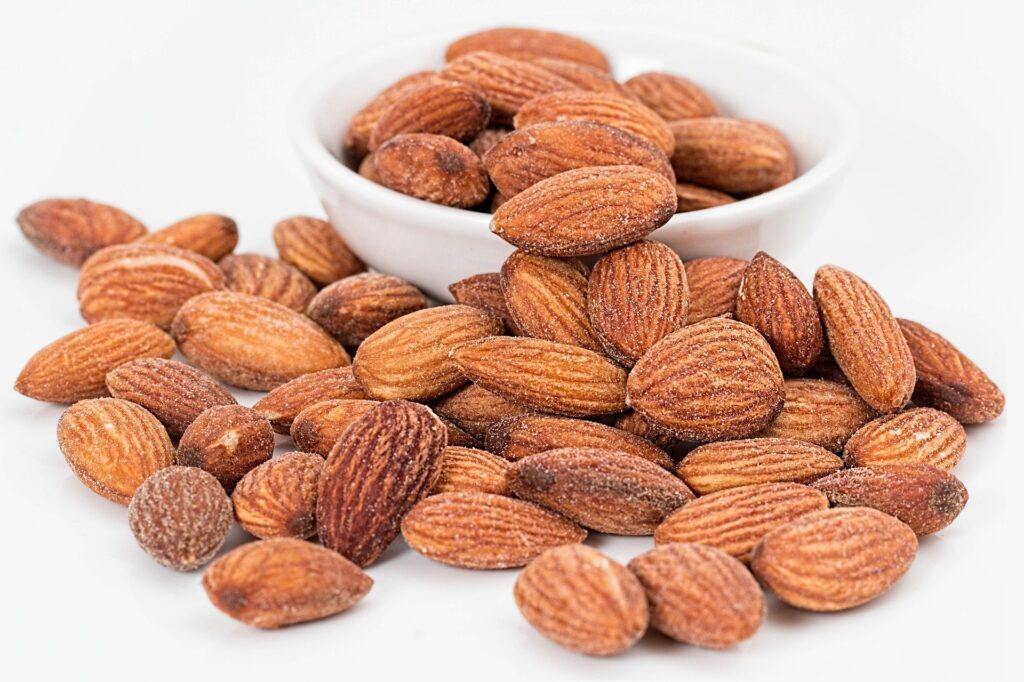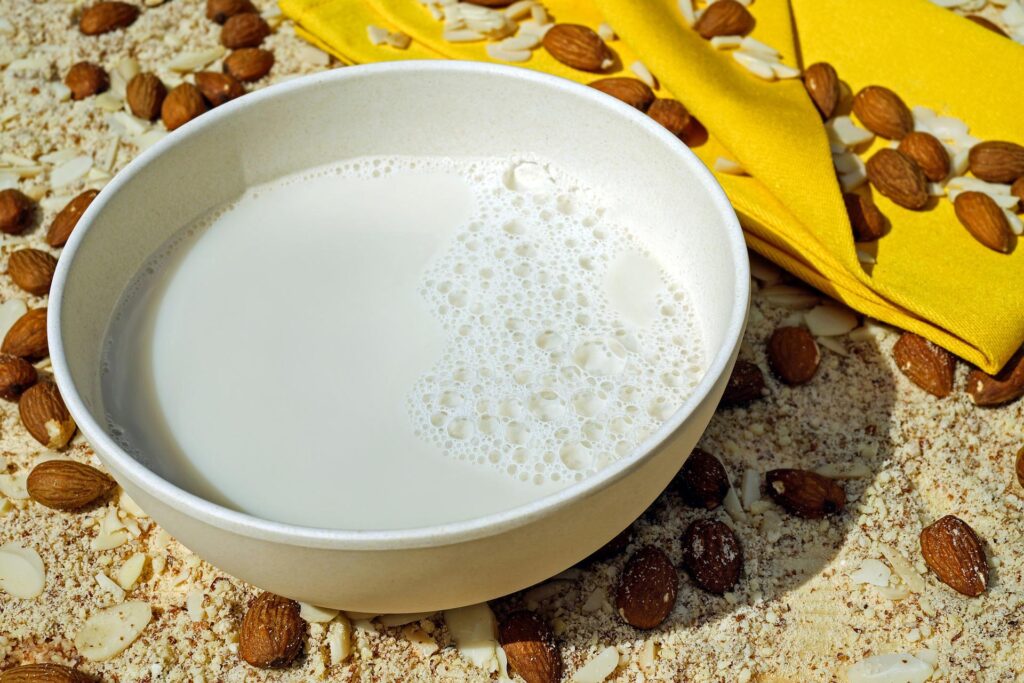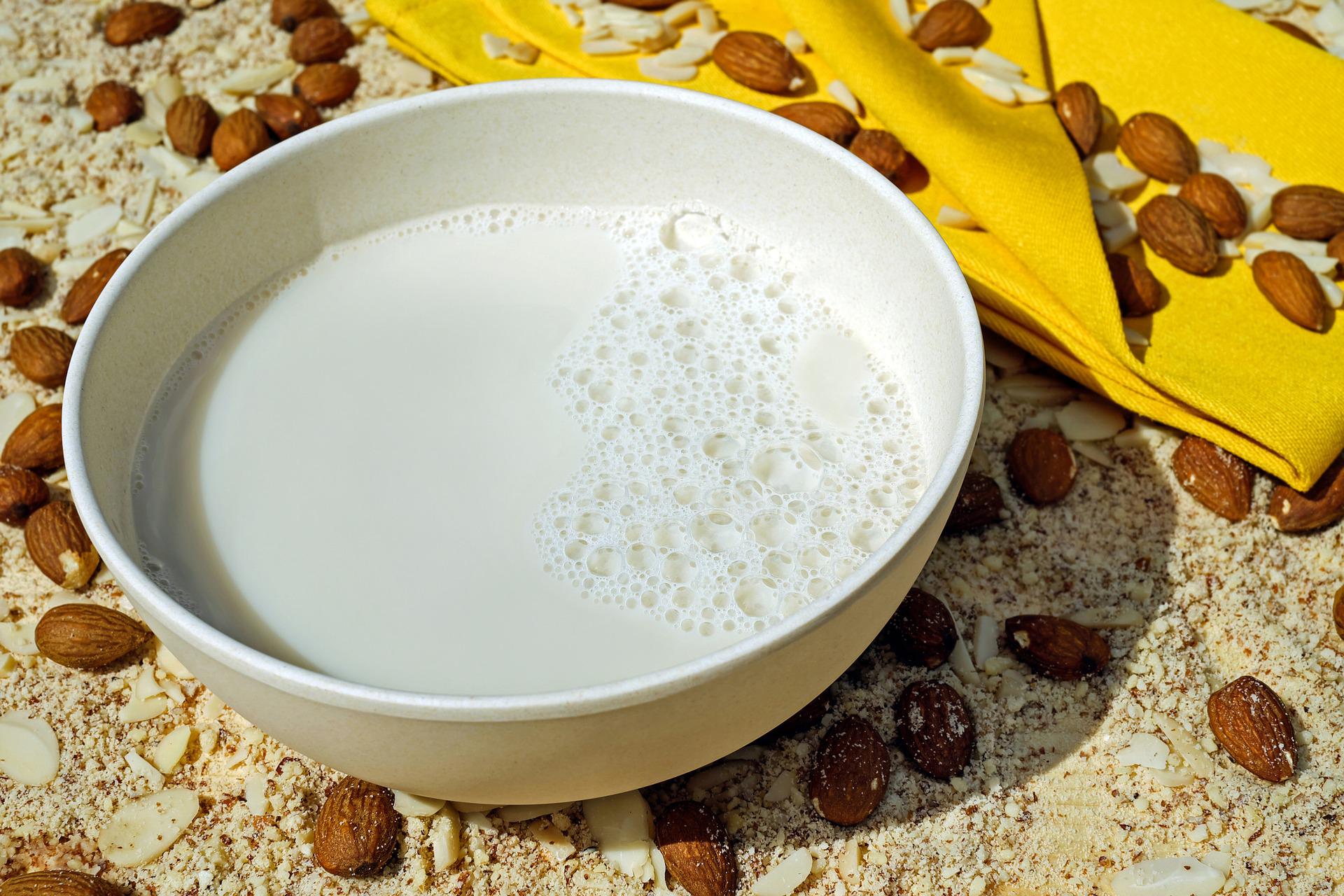Some of the links on this page are affiliate links, which means that Buzzy Kitchen earns commission from purchases made – at absolutely no extra cost to you. Thank you so much for supporting Buzzy Kitchen!
One of the best things about some milk substitutions, like almond milk, is that they usually last longer than dairy-based milk products. Commercially manufactured and sold almond milks, such as the very popular Alpro branded almond milk, are given an extra boost in the shelf life department, because of two important processes: pasteurisation and homogenisation. But does almond milk go out of date, still?
Let’s investigate…
What is Almond Milk?
Almond milk is, quite literally, a milk (of sorts) made from actual almonds.
To start with, the almonds are soaked in water overnight (minimum). The longer the almonds are left to soak in the water, the more creamy the almond milk will be at the end. For a very creamy almond milk, the almonds should be soaked for up to 48 hours.
Once the almonds have soaked, they are drained and then rinsed, then crushed or blended in a fresh batch of water.
Once that has been done, the entire mixture of water and blended almonds is put through a strainer to get rid of the solid lumps of nut. What is left, once the lumps have been removed, is almond milk.
These days, you can buy almond milk that has been fortified with all sorts of vitamins and minerals, and you can also buy flavoured milks, such as chocolate almond milk, or almond milk that is flavoured to closely mimic the taste of cows milk.
If It’s Not Dairy, Does Almond Milk Go Out of Date?
Yes, almond milk can and will still go off.
You can prolong the product’s lifespan by storing it in the correct container, in the correct place. And, when compared to cows milk, it’ll definitely last longer.
When you buy commercial almond milk, the container will have a best-by or use-by date on it somewhere. This is the time at which the manufacturer no longer guarantees the product will be at its best. That doesn’t mean the product has gone bad; it just means the product might start to change in terms of being safe to consume.

Almond milk that you make at home will not last as long as commercially purchased almond milk. The latter contains preservatives and other additives that help to prolong the shelf life. Homemade versions are highly unlikely to contain those same additives.
How Long Does Store-Bought Almond Milk Last in the Fridge?
Store-bought almond milk lasts longer than homemade almond milk, because of the preservatives and other additives I previously mentioned.
If you take a look at the packaging, you’ll see that it will say something like:
“Once opened, consume within 5 days of opening.”
– Almond milk packaging
The manufacturer recommends consuming it within 5 days of opening, but that doesn’t mean the product will start to turn back at midnight on the 6th day. The use-by date is a safe recommendation. You can still consume almond milk that has been opened and in the fridge for longer than 5 days providing it doesn’t look, smell or seem as though it has turned bad.
Generally, store-bought almond milk will last for 7 to 10 days in the fridge.
If the recommended period of time stated on the packaging has passed, take a look at the product. Does it still look and smell okay to you? If it doesn’t, dispose of it. If it does, it’s likely safe to consume.
Use-by or eat-by dates are safe recommendations. You will usually get a few days on top of what it says on the packaging.
How Long Does Homemade Almond Milk Last in the Fridge?
If you’re making your own almond milk, be aware that, unless you freeze it, it will not last quite as long as commercially manufactured almond milk.
You should consume homemade almond milk within 2 to 3 days after you have made it.
You should also ensure that you store it in the fridge, in an airtight jug or container.

Can Almond Milk Go Bad Even When It’s Un-Opened?
Yes, almond milk can go bad even when it hasn’t been opened.
There are different varieties of almond milk on the market these days, usually falling into one of two categories:
– refrigerated almond milk – sold in the refrigerated section of the supermarket and must be kept in the fridge when you get it home
– shelf-stable almond milk – not kept in the refrigerated section of supermarkets, can be kept in the cupboard when you get it home, must be refrigerated once opened
Refrigerated almond milk will turn bad quite quickly after you have bought it, much like other dairy products such as cows milk.
Shelf-stable almond milk, on the other hand, has a much longer lifespan.
What Happens to Almond Milk When It Turns Bad?
You can sometimes tell when unopened almond milk has turned bad without even having to open the container and look inside. Cardboard cartons of almond milk will expand due to a build-up of gases on the inside. Cartons that have been damaged in some way, especially cartons with leaks, should be treated as contaminated and disposed of immediately.
When it comes to the actual almond milk itself, you will need to look, smell, and swish-around the fluid to see whether or not it has gone bad.
Obviously, if you see any dark spots, dispose of the milk. The dark spots could be mould growth. Consuming it will likely make you rather unwell.
If you see any lumping or clumping-together in the almond milk, dispose of it. You should also do the same if the milk seems thicker than usual. Almond milk is runnier and thinner than milk is (although this does vary from brand to brand), so if it moves around with the consistency of cream, it’s time to get rid of it. This is more likely to happen with refrigerated almond milk than its shelf-stable counterpart.
If the almond milk has changed appearance in any way, including in colour, then it is not recommended that you consume it.
You can also do the sniff test with your almond milk to determine its freshness. You should know what your almond milk smells like when it is fresh, so if the smell changes in any way, shape or form, it’s time to get rid of the milk. It can smell sour, earthier, or even just plain weird or ‘off’.
Can You Keep Almond Milk in the Freezer?
You can keep almond milk in the freezer, but you might not want to…
You probably won’t be able to drink the almond milk once you have frozen and then thawed it, because it has a nasty habit of separating. As you can imagine, not only does that mean it has a rather unpleasant texture but it’ll also taste pretty bad, too.
If you are planning on using the frozen almond milk in a baked dish, or in another dish/way that you are going to cook, you can do so without any issues.
If you’re planning on drinking the almond milk, or adding it to your cup of tea or coffee, you’ll probably want a carton that hasn’t been frozen.
